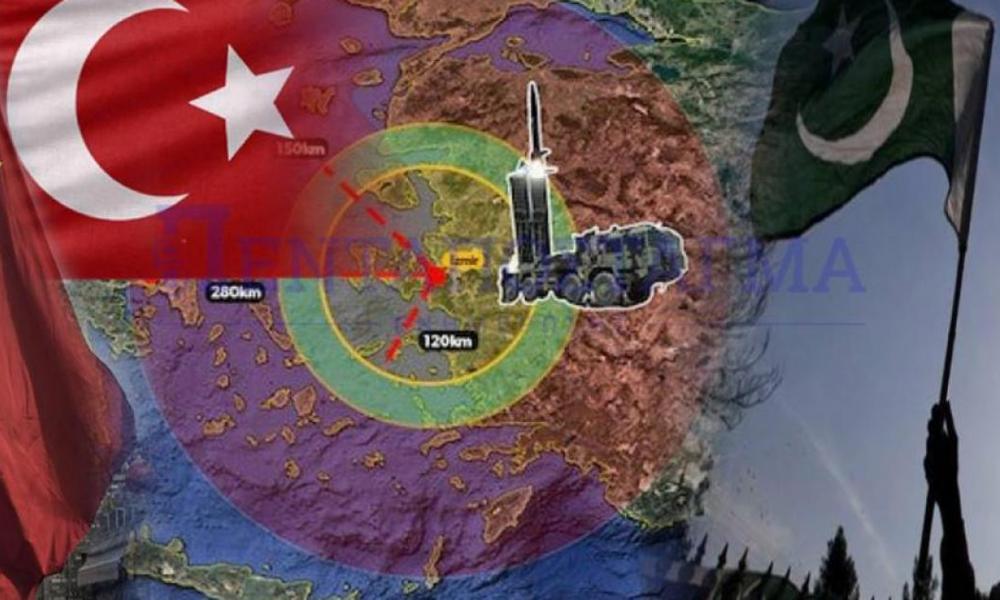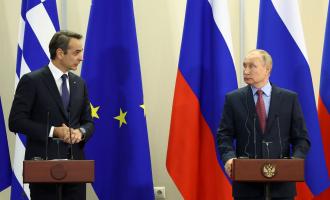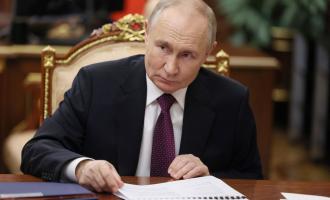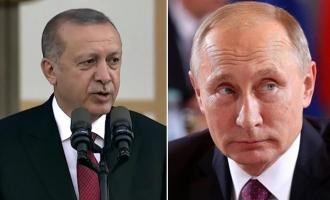Pakistan is seeking armed drones from Turkey and is looking to deepen the already strong bilateral cooperation, especially in the defence arena, even as both countries align on key issues including Kashmir and Afghanistan.
The growing ties, along with a possible axis with China, are beginning to cause concern among security experts in Delhi.
Sources in the Indian defence and security establishment said possible procurement of armed drones, especially the Bayraktar TB-2 that helped Azerbaijan defeat Armenia last year, joint defence projects, collaboration in Afghanistan and greater Turkish investments in Pakistan are some of the issues that are under discussion between the two countries.
In what is being seen by Indian agencies as the latest attempt to cement the relationship, Pakistan President Arif Alvi Monday conferred the Nishan-e-Imtiaz or Order of Excellence — a military award — on the Commander of the Turkish Land Forces, Gen Umit Dundar, who is on a visit to the country.
In April this year, the Turkish Armed Forces had awarded Gen Nadeem Raza, Pakistan’s Chairman of Joint Chiefs of Staff Committee, the Legion of Merit for his services in promoting defence relations between the two countries.
In Pakistan, Gen Dundar also held a meeting with Pakistan Army Chief, Gen Qamar Javed Bajwa. Following the meeting, the Inter-Services Public Relations (ISPR) of the Pakistani military issued a statement saying “matters of mutual and professional interest with special emphasis on defence and security collaboration between the two brotherly countries were discussed”.
The visit by the Turkish officer is part of a series of exchanges between top military officers and defence officials of both countries.
“Pakistan’s relationship with Saudi Arabia and UAE has seen a dip. Turkey is trying to project itself in the Middle East as the counterbalance to these two countries and hence Pakistan growing closer to it is part of a larger game that is being played,” a defence source told ThePrint.
The source added that Turkey has focused on indigenous defence industry and has an edge in drone technology and in designing and manufacturing naval ships.
“Pakistan, through China, has the technology for missiles, both conventional and nuclear besides fighter aircraft, something which Turkey seeks,” the source said.
The source further said both sides have on numerous occasions discussed the possibility of armed drones “something which Ankara is not fully comfortable in selling to Islamabad”.
It all, however, depends on what Pakistan has to offer in return to Turkey and that is what matters, a second source said.
A third source in the defence and security establishment said that the current focus of both countries is on Afghanistan. “Turkey is looking at expanding wherever it can. Afghanistan is an area where it looks to have some sort of influence and say,” the source said. “Militarily and politically, Pakistan and Turkey have grown closer.”
The source said that Turkey will be taking over the security of the Kabul Airport with the pullout of foreign forces. “The Taliban has said that Turkey will be treated as a NATO member and not as a fellow Muslim country,” he added. “As a result, Turkey needs Pakistan, especially as it is going to take over the security of the airport to begin with.”
‘Growing ties a matter of concern’
Indian security experts told ThePrint that the growing ties are a matter of concern.
Air Marshal Anil Chopra (retd), Director General of the Centre for Air Power Studies (CAPS), said Turkish President Recep Tayyip Erdogan has spoken openly against India removing Article 370 in Kashmir.
“Pakistan and Turkey enjoy close cultural, historical and military relations,” he said. “Turkey supports Pakistan’s membership of the Nuclear Suppliers Group. Pakistani and Turkish Armed Forces also hold many joint military exercises.”
He further pointed out that Turkey is backing the trilateral process between Pakistan, China and Afghanistan over a peace deal in Kabul following the withdrawal of US troops from the region.
“Turkey has been backing the trilateral process. With the US exit from Afghanistan, China is seeking Pakistan support to get into the region,” the retired air marshal said. “There is a triangle that is forming between Turkey, Pakistan and China. None of these countries are really friends with India and hence anything about this axis should concern India. Any coming together of the three is detrimental to India.”
His concerns were shared by the Army’s former Director General of Artillery, Lt Gen P.R. Shankar (retd), who said there is no doubt that growing Pakistan-Turkey relations is a matter of concern but added that Turkey is bound by its NATO membership.
He told ThePrint that Turkey has managed to get its hands on a fair amount of technology, thanks to its NATO membership. “And NATO membership is exactly what will prevent Turkey from running amok,” he added. “Turkey gains a lot from its NATO membership than anything else. So it will be very careful about what it does with Pakistan.”
The officer also said western countries will not allow Turkey, China and Pakistan to come together as one block. He added that Pakistan seeking armed drones from Turkey while it can get the technology from China indicates that Islamabad is trying to spread its search.
Turkish drones a game-changer
If Pakistan manages to land Turkish drones, it will significantly improve the country’s capabilities.
The Turkish armed drones, Bayraktar TB-2, had helped Azerbaijan defeat Armenia in the war in November 2020.
While Armenia only fought with tanks, artillery and air defence systems, Azerbaijan relied heavily on drones, especially the Bayraktar TB-2, and loitering munitions.
The skirmishes have had huge implications for modern warfare, underlining the importance that drones are likely to play in the future.
Turkey has so far sold its Bayraktar TB-2s to Poland, Ukraine and Qatar besides Azerbaijan. It is also in talks with Albania for the sale of these drones.
Air Marshal Anil Chopra (retd) told ThePrint that Ankara’s Bayraktar TB-2 has been combat tested not just in Azerbaijan but also in Turkey’s conflict with the Kurds and in Libya and Syria.
He added that while Turkey’s removal from the F-35 programme, because of its S 400 purchase from Russia, has been a setback for the country’s aircraft industry, it still holds some pedigree in this sector.
According to him, Turkey’s aviation experience includes the licensed production of F-16 Fighting Falcon jets, CASA CN-235 light transport aircraft, apart from helicopters and a variety of UAVs.
Chopra said that while Pakistan eyes the drone, Turkey needs fighter aircraft systems and missile technology from Islamabad that is basically of Chinese origin.
Turkey though isn’t the only country that Pakistan is looking to for armed drones.
Over the past few years, there have been multiple media reports about Pakistan getting armed drones from China. In 2018, the Pakistan Air Force’s Sherdils Aerobatic Team had, on its official Facebook account, said that the Pakistan Aeronautical Complex at Kamra and the Aviation Industry Corporation of China’s Chengdu Aircraft Industrial (Group) Company will jointly manufacture 48 Wing Loong II drones.
Military ties between Pakistan and Turkey
While Islamabad is yet to land the Turkish drones, it does share a fruitful military partnership with Ankara.
Pakistan has relied on Turkey for the upgrade of its three Agosta 90B diesel-electric attack submarines and for designing and constructing new Corvettes and oil tankers.
Pakistan had earlier this year also granted another extension to a helicopter deal that it signed with Turkey in July 2018.
The deal, valued at $1.5 billion, is for 30 T-129 Atak helicopters. The delivery has been stuck due to the US’s refusal to issue export licenses for engines and other parts made by American firms.
(Edited by Arun Prashanth)

Κόσμος
Ενημερώθηκε στις:
Pakistan eyes drones & deeper ties with Turkey, concerns in Delhi of possible triad with China

Ακολουθήστε το Πενταπόσταγμα στο Google news













